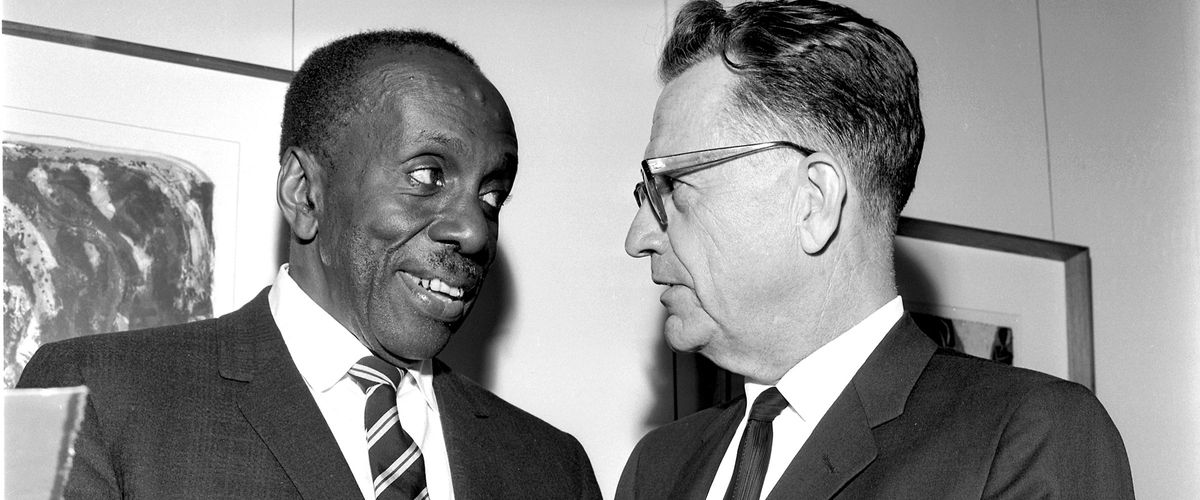Dean George Makechnie (Wheelock’29,’31, Hon.’79)
Dean George Makechnie’s Legacy
George Makechnie (Wheelock’29,’31, Hon.’79) impacted Boston University by witnessing and participating in its history. In his career at Boston University, Dean Emeritus George Makechnie was dean of one college, acting dean of two others, and a founder of a fourth; he earned bachelor’s and master’s degrees in the Boston University Wheelock School of Education & Human Development (Wheelock); and he was a member of first the Wheelock administration and later its faculty until 1945, when he was named Dean of Sargent College. In 1979, the University awarded him an honorary degree. He established and directed a variety of programs and taught in several schools on campus and around the city. No one else has played as many roles in the University as he did; but then, he had more time: he enrolled as a freshman in 1925 and was at the University full time until 2003.
A Man Who Wore Many Hats
Under Dean Makechnie’s leadership, Sargent grew from a women’s college for physical education teachers into a coeducational school with bachelor’s, master’s, and doctoral programs in the full range of allied health fields.
Makechnie was instrumental in establishing Boston University’s School of Nursing and was acting dean of the Boston University Wheelock School of Education & Human Development in 1943–44 and dean ad interim of the School for the Arts from 1959 to 1961.
After his official retirement in 1972, Makechnie wrote Optimal Health: The Quest—A History of Sargent College; Howard Thurman: His Enduring Dream; 70 Stories About Boston University, 1923–1993; his memoir, Fourscore Years & Twelve at Home and Boston University; and a series of monographs on Boston University history. He was named University Historian in 2001, 71 years after his first BU appointment.
Dean George Makechnie and Howard Thurman
When Howard Thurman arrived at Boston University in 1953, he was welcomed by George Makechnie, then dean of Sargent College.
Thurman was curious about who this person could be because Makechnie had actually written him a letter of welcome prior to his arrival on campus. Thurman knew not everyone was pleased about his appointment, but George Makechnie seemed delighted that he was coming.
Break Barriers of Divisiveness
When they met, they discovered they were kindred spirits. Each in their own way had worked to break barriers of divisiveness that separate people throughout their lives. George Makechnie had integrated the residence halls at Boston University in 1945, to name just one instance.
Howard Thurman and George Makechnie declared each other as brothers, their families became one, and they both demonstrated that unity and community are possible, regardless of race.
At the time of Dean Makechnie’s official retirement in 1972, Howard Thurman wrote these words to him: “From you I have learned much. The most precious gift you have given me is yourself—in such an offering the miracle appeared, you somehow managed to give me to myself, greatly enriched, and spiritually glorified. Thank you and thank God!”
Preserving Howard Thurman’s Legacy
In 1986, Dean Emeritus George Makechnie founded the Howard Thurman Center for Common Ground, in memory of his close friend and colleague Howard Thurman. They had shared a belief in the unity of all people, and through his tireless effort George Makechnie sought to continue Thurman’s work.
Located at 19 Deerfield Street in a small office, under Makechnie’s direction, the Howard Thurman Center evolved with the times, advancing Thurman’s belief in the unity of all people and their shared commitment to breaking barriers of divisiveness.
The Search for Common Ground
Makechnie was motivated by Thurman’s statement about why he came to Boston University. “At Boston University,” Thurman said, “I will touch at every step of the way hundreds of young people who themselves will be going to the ends of the earth to take up their responsibilities as members of communities. Conceivably this means the widest possible dissemination of the ideas in which I believe.”
Thurman’s ideas were that through the Search for Common Ground, “…Meaningful and creative experiences shared between people can be more compelling than all of the ideas, faiths, fears, concepts, ideologies, and prejudices that divide; and if such experiences can be multiplied and sustained over a sufficient duration of time, then any barrier that separates one person from another can be undermined and eliminated.”
All People in Harmonious Unity
On the occasion of Howard Thurman’s 100th birthday, Makechnie shared these words: “My work in preserving Howard Thurman’s legacy defines who I am, and it meets ‘the deepest needs and aspirations’ of my spirit. The potential of Howard Thurman’s dream continues to be actualized as others ‘see the manifestation and feel the pull of its challenge’ and ‘through sheer contagion they relate to it and its demands.’ They, too, keep alive the dream in their hearts that one day all people shall dwell together in harmonious unity—a unity that breaks through all barriers of divisiveness.”
Keep Alive the Dream
George Makechnie served as director until 1999, when he recommended his successor to the Trustees of Boston University. In the year 2000, the 100th birthday of Howard Thurman, Katherine Kennedy was appointed the first paid director of the Howard Thurman Center for Common Ground. Makechnie also asked the University to ensure the continued existence of the Thurman Center. They did so by making it a department of the Dean of Students office.
In the fall of 2004, a new physical space was designed in the George Sherman Student Union and in January 2005, the Howard Thurman Center had a new home which serves all students, faculty, and staff.
On March 22, 2005, Dean Emeritus George K. Makechnie died knowing that his and Howard Thurman’s enduring dream continues.
In October 2019, the Howard Thurman Center for Common Ground will be relocated to 808 Commonwealth Avenue. Learn more here…
